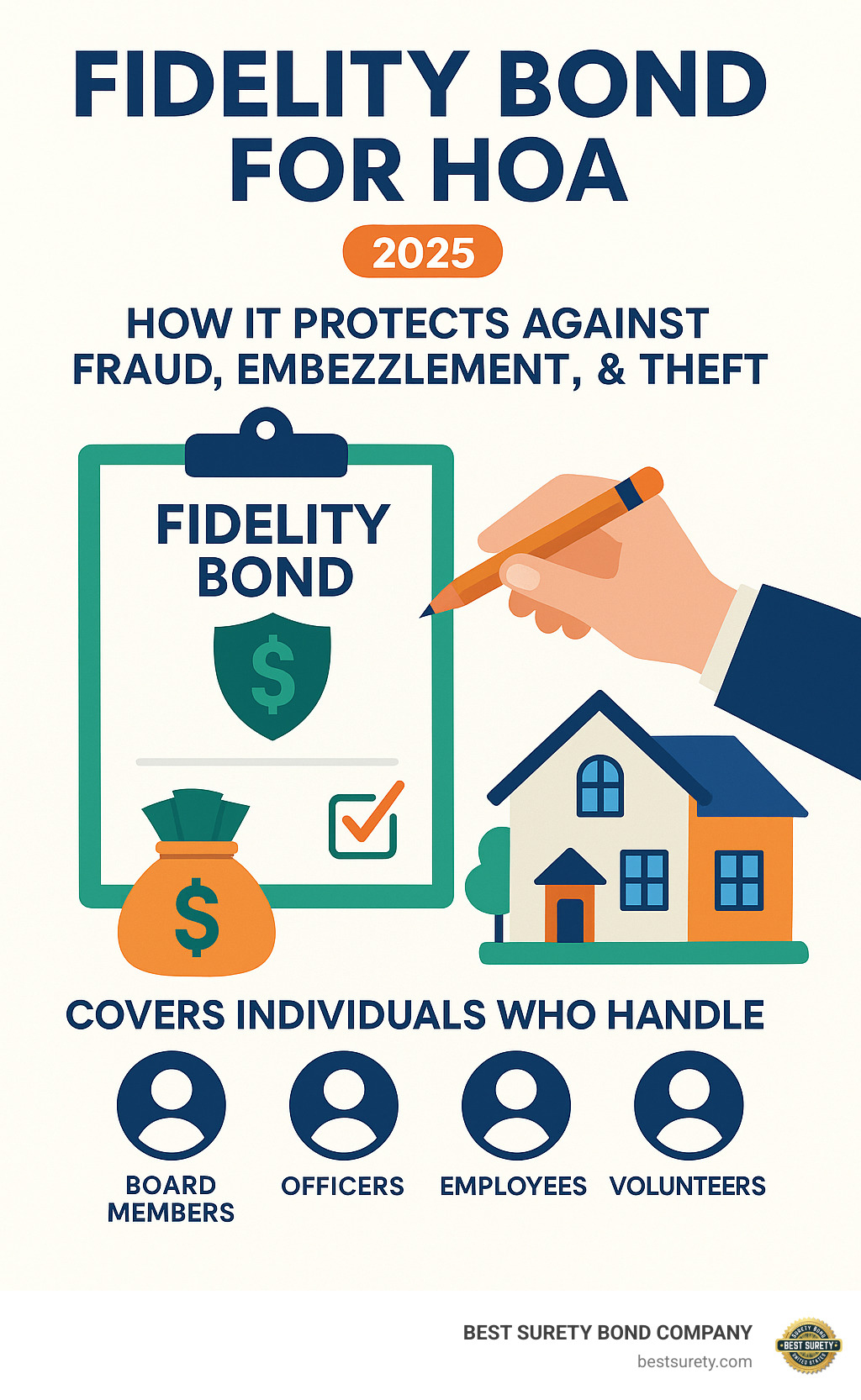What is a Fidelity Bond for Your HOA?

A fidelity bond for HOA is a crucial safeguard protecting a homeowners association’s collective funds from financial misconduct. While HOA board members are often neighbors and friends, the power they hold can be abused. Unfortunately, acts like fraud and embezzlement are common risks for HOAs and condo associations.
What is an HOA Fidelity Bond?
A fidelity bond for HOA is a type of surety bond designed to protect homeowners associations from financial losses due to dishonest acts like theft, fraud, or embezzlement. It covers individuals who handle the association’s money, such as:
- Board members
- Officers
- Employees
- Volunteers
- Property managers or their staff
Many HOAs are required to have this bond by federal agencies like the FHA and Fannie Mae, as well as various state laws. This vital protection helps HOAs recover lost funds and maintain financial stability for all homeowners.

Simple fidelity bond for HOA glossary:
What Exactly Is a Fidelity Bond for an HOA?
A fidelity bond for HOA is a type of employee dishonesty bond that acts as a financial safety net for your community’s funds. Unlike standard insurance that protects the policyholder, a fidelity bond protects the association and its homeowners from the dishonest acts of those managing the money.
The bond provides a financial guarantee. If an individual handling HOA funds commits theft, fraud, or embezzlement, the bond reimburses the association for the loss up to the coverage limit. It’s a form of crime protection designed to guard against internal dishonesty.
The Key Purpose of a Fidelity Bond
The primary purpose of a fidelity bond for HOA is to safeguard the community’s financial health. HOAs collect substantial funds through dues and assessments, which are vital for maintenance, repairs, and operations.
Without a bond, a single act of fraud could cripple an HOA’s finances, leading to:
- Financial Losses: Loss of operating funds, reserve funds, or money for specific projects.
- Insolvency: Inability to pay bills or perform essential maintenance.
- Special Assessments: Homeowners may be forced to pay large, unexpected fees to cover the stolen funds.
- Loss of Confidence: Misconduct erodes trust between the board and the community, hindering effective governance.
A fidelity bond for HOA provides a clear path to reimbursement, protecting homeowners’ money. It ensures the HOA can continue operations, helps the board fulfill its fiduciary duty, and brings financial stability and peace of mind to the community.
Why Your HOA Can’t Afford to Be Without a Fidelity Bond
Your HOA handles significant sums of money, including operating and reserve funds. These funds are the lifeblood of your community, paying for everything from maintenance to major repairs. The question isn’t if you need a fidelity bond for HOA, but how comprehensive it should be.
Without a fidelity bond for HOA, your association is vulnerable to internal theft. Recovering embezzled funds without a bond is difficult and expensive, often requiring lengthy legal battles with no guarantee of success. This loss can lead to:
- Depleted Funds: Halting day-to-day services.
- Drained Reserves: Leaving the HOA unprepared for major expenses.
- Forced Special Assessments: Shifting the financial burden onto homeowners through unexpected fees.
- Denied Home Loans: Lack of proper bonding can prevent homeowners from securing FHA or Fannie Mae loans.
A strong fidelity bond for HOA also boosts homeowner confidence. It shows the board is responsible and dedicated to protecting collective assets, making a powerful statement of accountability.
State and Federal Mandates
For many HOAs, a fidelity bond for HOA isn’t just a good idea—it’s a legal requirement. Federal agencies and many states have specific rules to protect homeowners.
Here’s a look at some common requirements:
Federal Housing Administration (FHA) certification requires fidelity coverage equal to three months of dues plus all reserve funds. Coverage must include anyone handling finances, from board members to property management staff. More details on FHA requirements are available here.
Fannie Mae loan eligibility requires HOAs to carry fidelity bond for HOA coverage equal to three months of maintenance fees. Inadequate coverage can lead to loan denials for homes in the community. While some exceptions exist for small projects, the general requirement ensures financial protection. Learn more about Fannie Mae’s guidelines here.
Many states have their own laws. California Civil Code Section 5806 requires coverage for directors, officers, and employees equal to the association’s reserves plus three months of assessments. The law also mandates dual financial duties and annual CPA reviews. Read the full text here.
Virginia mandates a bond for the lesser of $1 million or the reserve balance plus one-fourth of the annual assessment (minimum $10,000). Find Virginia’s requirements here.
Other states have specific rules: Colorado requires at least a $50,000 bond for communities with 30+ units. Florida mandates a bond for all officers and directors covering the total funds under HOA control, unless waived unanimously. Mississippi requires coverage equal to reserves plus assessments for the previous year’s highest balance.
These mandates show the recognized importance of this protection. Even if not required, the security a fidelity bond for HOA provides far outweighs its cost.
Decoding Your Coverage: Who and What Is Protected?
A fidelity bond for HOA is a financial shield protecting your community’s funds from theft and complex fraud schemes, giving you peace of mind that your money is safe.

Here are some of the specific types of financial misconduct the bond typically covers:
- Embezzlement: A trusted person, like a treasurer, taking funds for personal use.
- Forgery: Illegally signing checks or altering financial documents.
- Check Fraud: Creating fake checks or altering real ones to steal money.
- Computer Fraud: Using a computer system to make unauthorized transfers or steal funds.
- Funds Transfer Fraud: Unauthorized electronic, phone, or written money transfers.
- Theft of Money or Property: Outright stealing of cash or other HOA assets.
- False Distributions: Creating fake payments or distributions.
- Invoice Padding: Inflating invoices or diverting funds from contracts.
- Loss of Funds in Transit: Covers cash or checks that go missing before being deposited.
Who Needs to Be Covered by the Fidelity Bond for HOA?
A fidelity bond for HOA must cover everyone who handles the association’s money and assets. If they can access the funds, they should be bonded. This includes:
- Board members and Officers: As fiduciaries, all board members (past, present, and future) and officers (especially the Treasurer, President, and Secretary) with signing authority or access to financial records must be covered.
- Employees, Volunteers, and Others: Any paid employees, volunteers collecting dues, in-house or outsourced bookkeepers, and committee members with financial access must also be included in the coverage.
- Property Management Company Staff: It’s critical to cover your property manager’s staff. Their company’s bond typically protects them, not your HOA. Your HOA needs its own fidelity bond for HOA that explicitly covers the management personnel who handle your funds. When you get your bond from BEST SURETY BOND COMPANY, we ensure everyone who needs coverage is included for your peace of mind.
Calculating Your Coverage and Cost
Determining the right coverage amount for your fidelity bond for HOA is crucial. You need enough to protect your assets without overpaying. Every HOA is different, so understanding how to calculate your required coverage is important.

How to Determine the Right Amount for a Fidelity Bond for HOA
The goal is to cover the maximum amount of funds that could be stolen at any one time. You can determine this amount by considering several factors:
- Federal requirements set a baseline. FHA certification requires coverage for three months of dues plus all reserves. Fannie Mae requires coverage for three months of maintenance fees. These are mandatory for homeowners to qualify for these loans.
- State laws also dictate coverage. For example, California requires reserves plus three months of assessments. Virginia requires reserves plus one-fourth of annual assessments (capped at $1 million). Colorado sets a $50,000 minimum for larger HOAs, and Florida requires coverage for all funds under HOA control.
- Governing documents like your bylaws or CC&Rs may require even higher coverage.
- The most practical approach is to calculate the maximum funds in custody at one time. This includes all operating, reserve, and special assessment funds. Your coverage amount should equal the total amount that could potentially be stolen.
Once you determine your required coverage, the cost is influenced by several factors. The bond amount is the biggest driver of the premium. Other factors include the number of people with financial access and the strength of your internal controls. HOAs with dual signature requirements and CPA reviews often get better rates due to lower risk. Your claims history and, for very large bonds, the credit history of key board members can also affect the premium.
The good news is that a fidelity bond for HOA is affordable. For example, a $25,000 bond might cost around $126 annually for a small group of bonded individuals, while a $50,000 bond could be around $257. These costs are minimal compared to the protection provided. For coverage needs over $100,000, a crime insurance policy may be a better fit, and we can help you find the best option.
Best Practices for Getting and Keeping Your Bond
A fidelity bond for HOA works best when combined with strong internal financial practices. These practices help prevent fraud, make your HOA more attractive to surety providers, and can lead to lower bond rates. They focus on financial transparency and control.
-
Internal Financial Controls: These are your everyday safeguards.
- Separation of Duties: The most critical control. The person collecting payments should not be the one approving bills, writing checks, or reconciling bank statements. Spreading these tasks creates checks and balances, a practice required by laws like California Civil Code Section 5806.
- Dual Signatures on Checks: Require two board member signatures on checks, especially for payments over a certain amount, to prevent unauthorized spending. This ensures at least two people approve major payments.
- Independent CPA Review: Have an independent CPA or accountant review your financial records annually. This provides vital oversight and helps catch issues early. A full audit is even better for larger HOAs.
- Bank Statement Reconciliation: The person who reconciles bank statements should be different from the one handling deposits or checks. This independent review helps spot irregularities quickly.
- Lockbox Services: Use a bank’s lockbox service so homeowner payments go directly to the bank, minimizing handling and risk.
- Cash Handling Policies: If you accept cash, implement strict policies for immediate counting, depositing, and record-keeping.
-
Board Member Background Checks: While not always required, running background checks on potential board members, especially those handling finances, is a smart and responsible step.
- Impact of Criminal History on Eligibility: A past criminal conviction for financial misconduct can affect your HOA’s ability to get a fidelity bond for HOA. A board member with a history of dishonesty can lead to higher premiums or denial of coverage. Some HOAs have bylaws that disqualify candidates whose history would prevent the association from being bonded.
-
Annual Policy Review and Updates: Your HOA’s finances change, so your fidelity bond for HOA needs to as well. Review your policy annually to ensure the coverage amount is adequate and meets all federal, state, and governing document requirements. Adjust coverage as your financial position changes.
By embracing these practices, your HOA builds a foundation of financial integrity and trust, demonstrating the diligence and responsibility that BEST SURETY BOND COMPANY values!
Frequently Asked Questions about HOA Fidelity Bonds
It’s normal to have questions about protecting your HOA’s finances. Here are answers to some of the most common inquiries we receive.
Does our property manager’s bond also cover the HOA?
This is a critical question. A property management company’s fidelity bond typically protects the management company itself from its own employee’s dishonesty. It usually does not cover your HOA from dishonest acts committed by your board members, volunteers, or even the manager’s staff against your HOA’s funds. For this reason, your HOA must secure its own dedicated fidelity bond for HOA. This ensures your association is the named insured and the policy is custom to protect your specific funds and all individuals who handle them.
How is a fidelity bond different from other types of insurance?
While sometimes called ‘fidelity insurance,’ a fidelity bond for HOA is fundamentally different. Standard insurance is a two-party agreement between you and the insurer, protecting you from loss. A surety bond is a three-party agreement:
- The Principal: Your HOA, which is required to get the bond.
- The Obligee: The party who benefits from the bond, such as the homeowners or a state/federal agency.
- The Surety: The company (like BEST SURETY BOND COMPANY) that issues the bond and guarantees payment.
A fidelity bond for HOA is a guarantee. If funds are misused, the surety pays the HOA for the loss and then seeks reimbursement from the dishonest individual. This third-party protection provides an extra layer of security.
How quickly can we get an HOA fidelity bond approved from BEST SURETY BOND COMPANY?
At BEST SURETY BOND COMPANY, we’ve streamlined our process for speed and convenience. We offer instant online quotes and quick approvals, often issuing bonds the same day. We provide the lowest rates in the industry without compromising on coverage. Our user-friendly online platform makes applying for and managing your bond simple.
While we’re rooted in Texas as Houston’s trusted surety provider and serve all Texas counties, our licensing extends to all 50 states. This means we’re ready and able to help HOAs nationwide secure their bonding needs with our experienced team. Our main goal is to get your HOA bonded today with instant online approval, so you can focus on leading your community with complete financial confidence.
Secure Your HOA’s Future Today
Think of a fidelity bond for HOA as a shield for your community’s money and a foundational element of sound financial management. It provides vital protection against internal financial misconduct, safeguarding your neighborhood’s collective assets.

Securing a fidelity bond for HOA provides several key benefits: financial security against theft and fraud, ensuring operating and reserve funds are safe; legal compliance with federal (FHA, Fannie Mae) and state regulations, which is critical for homeowner loans; and member trust, fostering confidence through responsible financial oversight.
Don’t leave your HOA’s finances vulnerable. Here at BEST SURETY BOND COMPANY, we believe protecting your community should be simple and affordable. We’re proud to be your local experts, based right here in Texas, but with a national reach, ready to help HOAs across the country. We’re all about providing the fastest turnaround and the lowest rates in the industry, making it easy and affordable to get the coverage your community truly needs.
Ready to give your HOA the financial peace of mind it deserves? Let’s get you protected today!
Get Your Instant, Low-Cost Bond Quote Now











